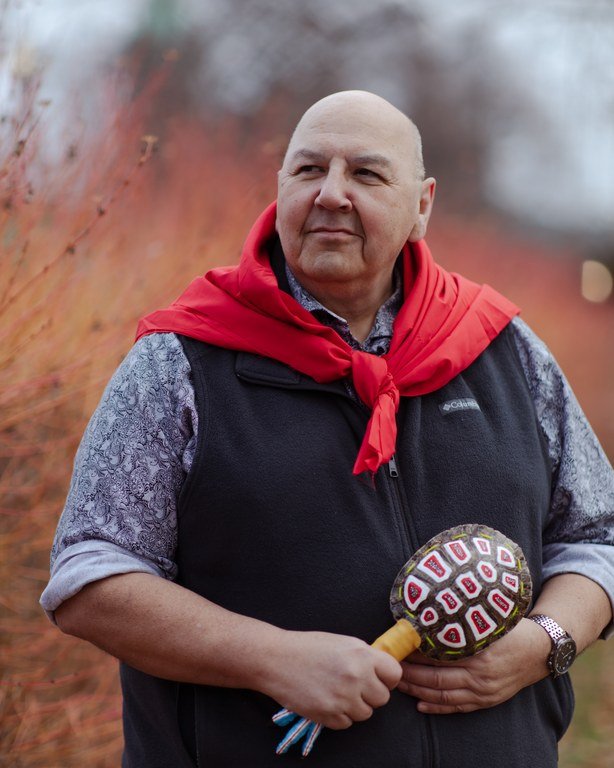3. In 1990, the term “Two Spirit” was coined near Beausejour, MB. Two Spirit is a translation of “niizh manidoowag”, which comes to us from which indigenous language?
Anishnaabemowin!
Long before the arrival of Europeans, hundreds of thousands of people across this continent lived in communities with their own customs and norms. Many indigenous communities did not have a strict distinction between “male” and “female,” as is commonly observed in Western cultures. In fact, many indigenous languages do not even have gendered pronouns--it just wasn’t important enough to be codified in the language!¹
Despite hundreds of years of persecution and violence, indigenous peoples with diverse gender identities and community roles have continued to exist. Queer indigenous activists in both “Canada” and the “United States” began communicating and working together more actively in the 1970s. In 1990, the Third Annual Intertribal Native American/ First Nations Gay and Lesbian Conference happened in Beausejour, MB, where Elder Myra Laramee shared a dream she had been gifted (and with it, the Anishnaabemowin term niizh manidoowag, literally “Two Spirits”).² This term has been adopted as a pan-indigenous term to be used by indigenous people who have diverse sexualities, gender identities, expressions, and societal roles. It is not a synonym for Western words like “gay” or “trans”.
““Two-Spirit is a placeholder of sorts. When individuals show up at a (Two-Spirit) gathering or some other indigenous event, the first question that is often asked is, “What Nation are you?” If the individual is male-assigned and is Anishinaabe, then we gift and/or honor them their word agokwe; if the individual is female-assigned, we would use the word okitcitakwe—if these individuals do not know these words already. Thus, “Two-Spirit” is a community organizing strategy or tool and not an identity. Although it is often positioned as an identity, it is neither an end-point nor an identity. When treated and positioned as an identity, it becomes highly problematic.””
I’ve put below just a few indigenous people and organizations you can follow to learn more. I’ll leave with just a few reminders for my fellow white and other non-indigenous folks:
Two Spirit is a term that is only for indigenous people to use. It is not ever appropriate for a non-indigenous person to self-describe as Two Spirit.
Two Spirit is not a term that has colonial equivalents. It’s not a synonym for “gay” or “transgender.”
People who are Two Spirit may or may not also identify as part of the queer community. Some people who are indigenous and part of the queer community but who are not Two Spirit may identify as indigiqueer.
Two Spirit is a collective term that makes reference to at least 130 different linguistically and Nation-specific terms⁴ that do not all mean the same thing! Two Spirit people have the right to self-identify in ways that are true to them, and it’s not our place to correct them.
Some Indigenous organization and activists to follow:




Further Learning
Smarter in Seconds -- https://www.instagram.com/p/C8e2CrJpTqB/?hl=en
Scott de Groot. “What Is Two Spirit? Part One: Origins.” Canadian Museum for Human Rights. Published March 26, 2024.
Victoria Anderson-Gardener. “Two spirit has always been an identity, even if we didn’t always have the words.” NFB Blog. Published August 21, 2023.
Harlan Pruden & Travis Salway. “Meet the Methods Series: What and who is Two-Spirit?” in Health Research.” Canadian Institutes of Health Research. Issue 2: October 2020.
Harlan Pruden. “Two-Spirit Conversations and Work: Subtle and at the Same Time Radically Different.” Transgender: A Reference Handbook. Eds. Aaron Devor and Ardel Haefele-Thomas. 2019. Pp. 134-137.
Matika Wilbur, Desi Small-Rodriguez & Adrienne Keene. All My Relations Podcast. Episode 6: Indigiqueer. April 3, 2019. https://www.allmyrelationspodcast.com/podcast/episode/47547617/indigiqueer
[transcript: https://www.allmyrelationspodcast.com/post/ep-6-indigiqueer]
Sources/Endnotes
Scott de Groot, “What is Two-Spirit? Part One: Origins.” Canadian Museum for Human Rights. Published March 26, 2024. https://humanrights.ca/story/what-two-spirit-part-one-origins
Harlan Pruden & Travis Salway. “Meet the Methods Series: What and who is Two-Spirit?” in Health Research.” Canadian Institutes of Health Research. Issue 2: October 2020. https://cihr-irsc.gc.ca/e/52214.html
Harlan Pruden. “Two-Spirit Conversations and Work: Subtle and at the Same Time Radically Different.” Transgender: A Reference Handbook. Eds. Aaron Devor and Ardel Haefele-Thomas. 2019. p. 134
Ibid., p. 135
